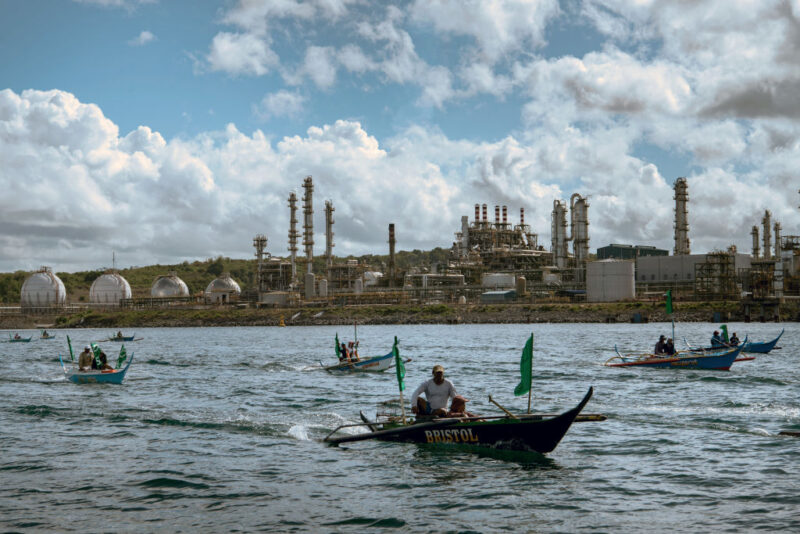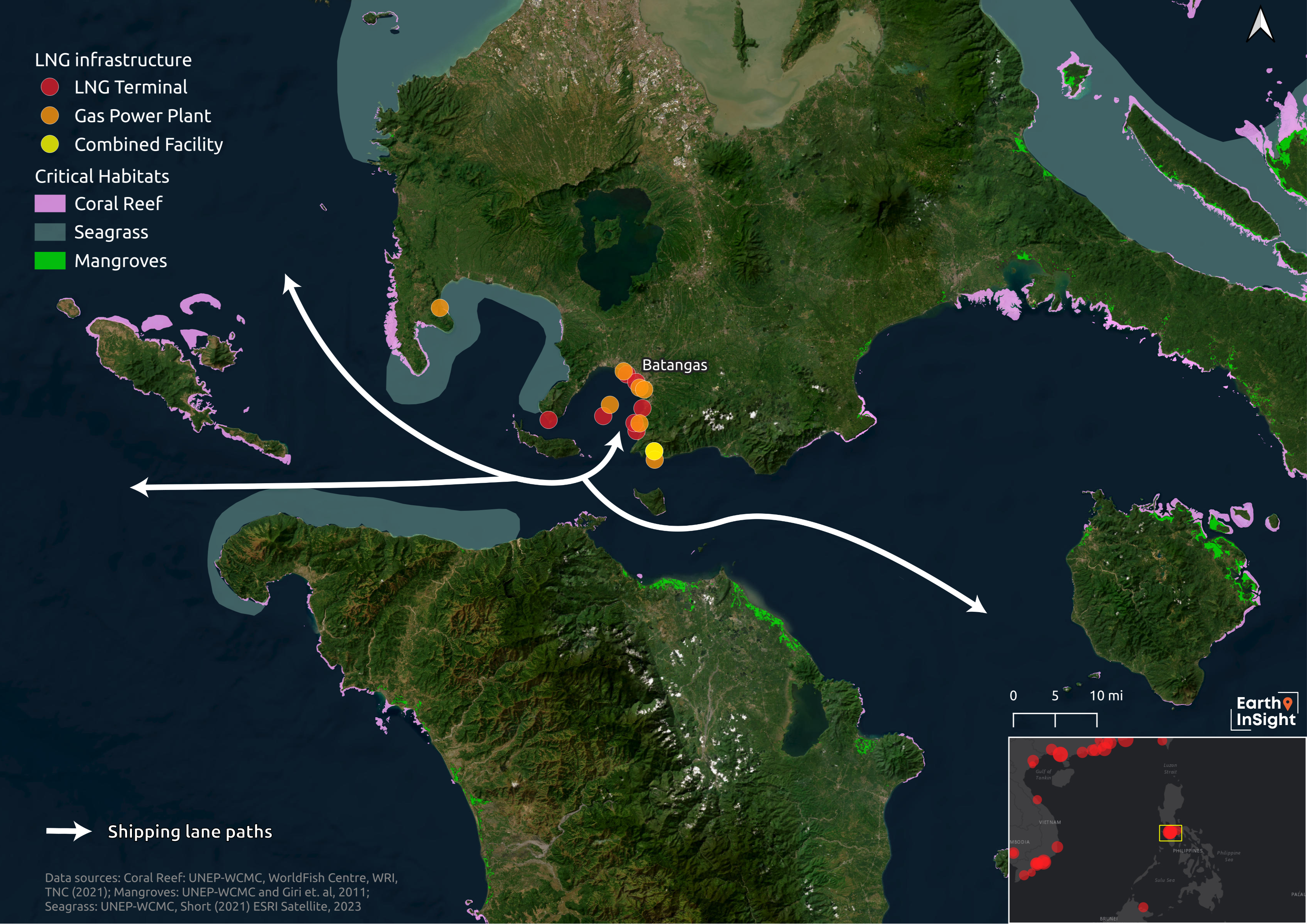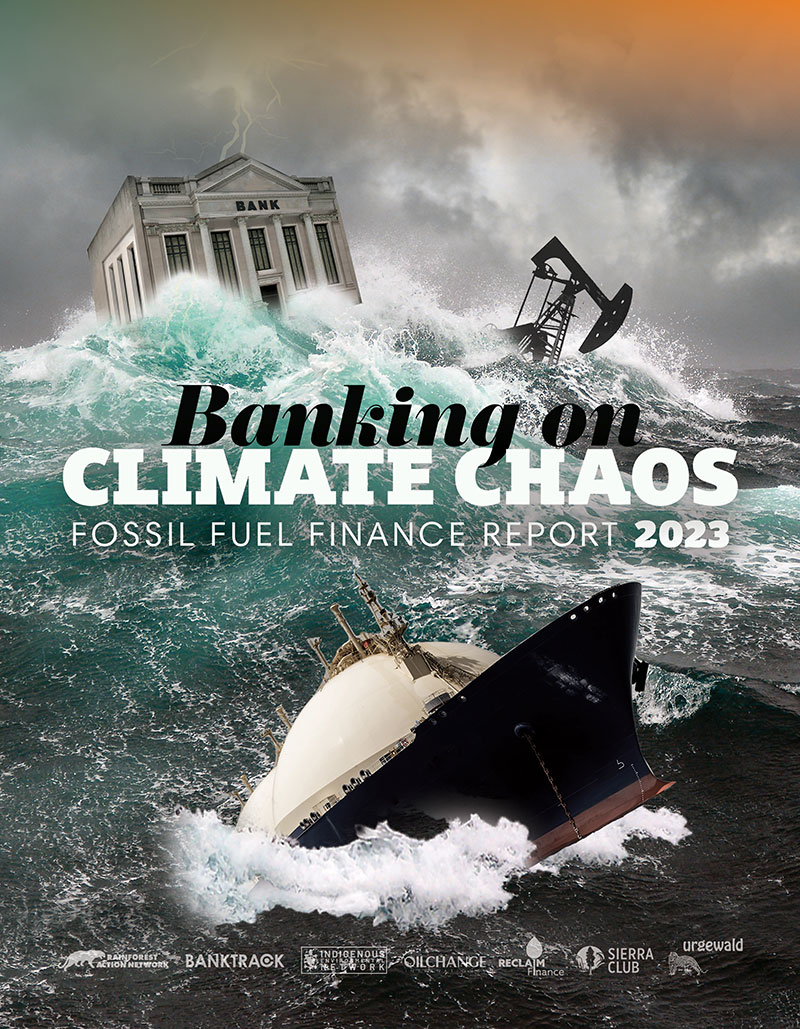This frontline story accompanies the Banking on Climate Chaos: Fossil Fuel Finance Report 2023, produced in collaboration with the Center for Energy, Ecology, and Development (CEED).
Located at the heart of the Coral Triangle, the Verde Island Passage (VIP) in the Philippines is the most biodiverse marine habitat in the world – and is referred to as the “Amazon of the oceans”. The VIP, and the 2 million people who call it home, and rely on it for sustenance and livelihood – including over 12,000 fisherfolk – are under threat by massive fossil fuel development of both methane (LNG) import terminals and fossil gas-powered power plants.
Liquefied “natural” gas – aka methane gas – is being touted by the fossil fuel industry as a “bridge fuel.” But methane has 80 times more climate-warming potential than carbon dioxide over a 20-year period. LNG build-out is happening at drastic rates all over the world, with Batangas, Philippines being the epicenter of both LNG and gas power plant expansion in the region, led by the Philippine conglomerate San Miguel Corporation Global Power Corporation (SMC Global Power).
From the Center for Energy, Ecology, and Development (CEED) Philippines Fossil Gas Landscape Report:
The Philippine Energy Plan 2018-2040 and pending legislation are working towards a “world-class, investment-driven and efficient” fossil gas midstream and downstream industries that would develop the country as the LNG trading and trans-shipment hub of Asia-Pacific. 16 of the 45 proposed LNG import terminals and gas plants across the Philippines are slated for the VIP.
SMC Global Power’s 14.1 GW of proposed projects accounts for half of the planned gas expansion in the Philippines and is also by far the largest in the region. SMC Global Power’s eight proposed gas-fired power plants for Batanagas will have a capacity of 12.3 GW, in addition to the already 1.8-GW plant that is under construction.
This build-out would make the Philippines an energy hub for Southeast Asia, locking us all into decades of more fossil fuel reliance – while providing no sustainable energy benefits to the communities they are expanding in. Filipino advocates are calling for the country to diversify energy sources to hasten the transition from a coal-dominated sector to renewable energy, and are pushing back against plans to rely on volatile prices and markets of imported gas.
“These projects do nothing to support energy stability in the Philippines as resources are limited – resulting in needing to import from all over the world.” – Gerry Arances, Center for Energy, Equality and Development (CEED).
The VIP is already facing the impacts of the climate crisis, existing fossil fuel infrastructure, and ship traffic, including a devastating, 800,000-liter oil spill in February 2023. This development will only increase those impacts, including an increase in air, water, and thermal pollution from both the plants and an increase in tanker traffic; competition for freshwater due to the plants’ water usage; irreversible damage to both marine and land ecosystems; and even displacement of the coastal communities.
Fisherfolk and other community members are already dealing with a decrease in fish in the VIP, in addition to a rise of mercury levels in the water – something that will only increase with the increase of methane gas terminals.
“The more financing banks pour on fossil fuel companies and projects, the less hope climate-vulnerable peoples like communities in the Philippines have of a livable future. Right now, a devastating oil spill is sweeping through a biodiversity hotspot in our country known as the Verde Island Passage, our very own Amazon of the oceans which is also unfortunately the epicenter of fossil gas expansion in the country. It’s a stark reminder of the destruction that coal, gas, oil, and all other fossil fuels are capable of wreaking upon the environment and people, and banks like JPMorgan Chase and investors like Blackrock are bankrolling that destruction.” – Gerry Arances, CEED

A growing movement of frontline communities, churches, civil society organizations, fisherfolk, and community groups strongly oppose the gas power and LNG projects in Batangas due to adverse impacts to marine biodiversity and the livelihood of the people of Batangas. This broad network of opposition comes together around energy insecurity, expensive and volatile power rates, climate-blind frameworks, and threats to health, environment, and livelihood. They’re calling on the fossil fuel companies and banks bankrolling them to stay out of the VIP.
Financiers linked to the LNG terminals include ING Bank NV, China Bank Capital & China Bank; financiers linked to the power plants include Mizuho Securities Asia Limited, Standard Chartered Bank, Deutsche Bank & JPMorgan Chase.
From the Philippines, to Mozambique, to the U.S. Gulf Coast, LNG is expanding around the world at terrifying rates — and so is LNG financing, which increased by nearly 50% in 2022. Mizuho and Morgan Stanley are the world’s biggest bankers of LNG, lending $1.9 billion and $1.8 billion respectively to the top LNG-expanding companies in 2022 alone. Bank financing is what makes this destruction possible.
“You cannot sacrifice the welfare of people in exchange for profit, or for the interests of businesses. Our environment is a blessing, a gift we must cherish, not destroy… Let us all work together, join together in solidarity. We cannot let this be destroyed, because what is at stake is something precious not just for the Philippines but the whole world.” – Fr. Edu Gariguez, Protect VIP Convener
Learn more and follow along with the community resistance at
https://ceedphilippines.com/
Protectvip.org
Banking on Climate Chaos 2023
The Banking on Climate Chaos report assesses big banks' financing for fossil fuels. These case studies highlight how this financing harms local communities, who are fighting back.










